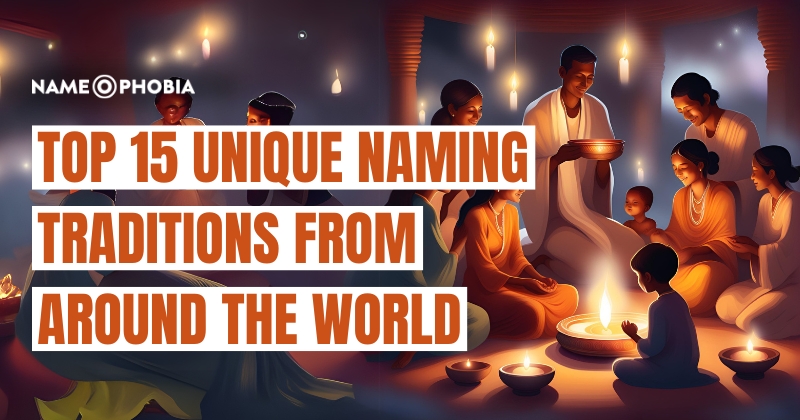Names are more than just identifiers; they carry deep meaning, culture, and history. Across the world, various societies follow unique practices that shape the names we hear daily.
These naming customs often reflect family values, societal beliefs, and hopes for the future.
Let’s explore 15 distinct naming customs from different parts of the world and understand how they influence identity.
Chinese Naming Traditions
In China, names generally consist of a family name (one character) followed by a given name (one or two characters).
The meaning of each character is chosen carefully to convey positive qualities like strength, wisdom, or prosperity.
Some parents consult fortune tellers or numerologists to select names that are believed to bring good luck, emphasizing the importance of a child’s future.
Icelandic Naming Traditions
Icelandic names are distinctive in that family surnames are not inherited. Instead, children are given a surname based on their father’s first name.
For example, Jón’s son would have the surname Jónsson (son of Jón), while his daughter would be Jónsdóttir (daughter of Jón). This system keeps surnames fresh for each generation, promoting individual family identities.
Hindu Naming Traditions
In Hindu culture, naming a baby is a significant event. The Namkaran ceremony, which takes place 11 to 12 days after birth, often guides the selection of a name.
Many names are derived from astrology or religious texts, reflecting the divine or symbolic qualities parents wish their child to embody. These practices are tied closely to spirituality and destiny.
Japanese Naming Traditions
Japanese names are written using kanji, characters that carry specific meanings. Typically, the family name comes first, followed by the given name.
Many names reflect nature, seasons, or virtues, such as beauty, grace, and strength.
While traditional names remain popular, modern Japanese names may focus on ease of pronunciation, blending old traditions with contemporary influences.
Also Check: Top 10 Tips for Creative Business Names Ideas (+ AI Generator)
Korean Naming Traditions
In Korea, children receive a family name and a given name made up of two syllables. The family name is consistent across generations, while the given name is often chosen with careful consideration of its meaning.
One fascinating aspect of Korean naming customs is that children in the same generation often share one syllable, linking them to the broader family lineage.
Nigerian Naming Traditions
Nigeria’s diverse ethnic groups each have unique naming customs, but one common thread is that names often reflect circumstances surrounding the child’s birth or the family’s aspirations.
For instance, names like “Adebayo” mean “the crown meets joy.” Naming ceremonies are celebrated as significant family events, often held soon after birth.
Russian Naming Traditions
In Russia, a person’s name typically includes not just a first name but also a patronymic derived from the father’s first name.
For example, if a father is named Ivan, his son’s patronymic would be Ivanovich (son of Ivan), and his daughter’s would be Ivanovna (daughter of Ivan). This practice underscores the respect for paternal heritage and the father’s role in the family.
-
Sale!

LEGO Bonsai Tree Building Set for Home Decor, 18+
Original price was: $ 49.99.$ 39.99Current price is: $ 39.99. Check on Amazon -
Sale!

LEGO NINJAGO Kai’s Dragon Battle Playset for Kids
Original price was: $ 37.99.$ 36.09Current price is: $ 36.09. Check on Amazon -
Sale!

Schleich Eldrador – Lava Dragon Action Figure for Children’s
Original price was: $ 24.99.$ 19.86Current price is: $ 19.86. Check on Amazon
Maori Naming Traditions
In New Zealand, the Maori people have naming customs that honor ancestors and emphasize spiritual connections. Names often reflect the individual’s ties to their tribe or family.
The tangi, a ceremonial event to welcome a child, plays a key role in Maori naming traditions, offering the child a sense of identity and belonging to the community.
Also Check: Japanese Names with Meanings: Top 10 Expert Tips for Picking
Jewish Naming Traditions
In Jewish communities, names frequently honor family members, especially deceased relatives. Among Ashkenazi Jews, the firstborn son is typically named after a grandfather, while Sephardic Jews may select names based on religious texts or important figures.
These practices connect the child to their family’s past and ensure the memory of loved ones is preserved.
Zulu Naming Traditions
In South Africa, the Zulu people follow naming customs that reflect the circumstances surrounding a child’s birth.
Names often express emotions or events, such as Sibusiso (meaning “blessing”) or Thulani (meaning “peace”). The naming ceremony is a joyful occasion that emphasizes the significance of the name in shaping the child’s future.
Greek Naming Traditions
In Greece, naming practices are heavily influenced by Orthodox Christianity. Children are often named after saints, particularly the one whose feast day is closest to the child’s birth.
It’s also common for the firstborn son to be named after the paternal grandfather and the firstborn daughter after the maternal grandmother, strengthening ties to family history and religious faith.
Also Check: Cute Pet Names: 10 Best Tips for Naming Your Furry Friend
Filipino Naming Traditions
Filipino names often combine the mother’s maiden name with the father’s surname, reflecting the country’s colonial history under Spain.
Filipino names can be long and may include multiple first and middle names. These practices demonstrate the influence of both family and Catholic traditions within Filipino society.
Swedish Naming Traditions
In Sweden, children receive a first name chosen by their parents, followed by a middle name and a family name passed down through generations.
Recent trends have seen parents combining surnames or using both mother and father’s last names. These practices balance individual identity with familial ties.
Turkish Naming Traditions
In Turkey, names are typically chosen to reflect positive qualities. For instance, Mehmet means “praiseworthy,” while Ayşe means “alive.” Turkish names often honor family members or have religious significance, especially in Islamic contexts.
The naming practices in Turkey blend modern ideas with traditional cultural values.
-

Funko Pop! How to Train Your Dragon 3 Toothless
$ 28.29 Check on Amazon -
Sale!

LEGO Christmas Tree – Mini Decorations for Kids & Adults
Original price was: $ 44.99.$ 30.99Current price is: $ 30.99. Check on Amazon -
Sale!

Yaheetech Christmas Tree Prelit Snow Flocked, Multiple Sizes
Original price was: $ 109.99.$ 99.99Current price is: $ 99.99. Check on Amazon
Brazilian Naming Traditions
In Brazil, a child usually receives two family names: the father’s surname first and the mother’s surname second.
In recent years, some families have chosen to reverse the order of the surnames or combine them.
These naming customs preserve both parents’ family identities and reflect the country’s strong sense of community.
Also Check: Top 280+ Badass Alligator Names With Meanings + AI Generator
Conclusion
Naming customs across cultures are a reflection of societal values, spiritual beliefs, and hopes for the future.
From honoring ancestors to embracing personal virtues, these naming practices shape the identities of individuals and families.
While some parents now turn to modern tools like AI name generators, traditional naming practices remain a profound way to preserve cultural heritage and give meaning to a child’s name.
No matter the method, these traditions continue to play a vital role in shaping future generations.



